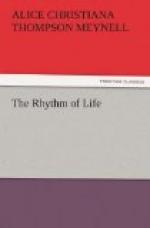What some of the Odes have to sing of, their author does not insist upon our knowing. He leaves more liberty for a well-intentioned reader’s error than makes for peace and recollection of mind in reading. That the general purpose of the poems is obscure is inevitable. It has the obscurity of profound clear waters. What the poet chiefly secures to us is the understanding that love and its bonds, its bestowal and reception, does but rehearse the action of the union of God with humanity—that there is no essential man save Christ, and no essential woman except the soul of mankind. When the singer of a Song of Songs seems to borrow the phrase of human love, it is rather that human love had first borrowed the truths of the love of God. The thought grows gay in the three Psyche odes, or attempts a gaiety—the reader at least being somewhat reluctant. How is it? Mr. Coventry Patmore’s play more often than not wins you to but a slow participation. Perhaps because some thrust of his has left you still tremulous.
But the inequality of equal lovers, sung in these Odes with a Divine allusion, is a most familiar truth. Love that is passionate has much of the impulse of gravitation—gravitation that is not falling, as there is no downfall in the precipitation of the sidereal skies. The love of the great for the small is the passionate love; the upward love hesitates and is fugitive. St. Francis Xavier asked that the day of his ecstasy might be shortened; Imogen, the wife of all poetry, ‘prays forbearance;’ the child is ‘fretted with sallies of his mothers kisses.’ It might be drawing an image too insistently to call this a centrifugal impulse.
The art that utters an intellectual action so courageous, an emotion so authentic, as that of Mr. Coventry Patmore’s poetry, cannot be otherwise than consummate. Often the word has a fulness of significance that gives the reader a shock of appreciation. This is always so in those simplest odes which we have taken as the heart of the author’s work. Without such wonderful rightness, simplicity of course is impossible. Nor is that beautiful precision less in passages of description, such as the landscape lines in Amelia and elsewhere. The words




